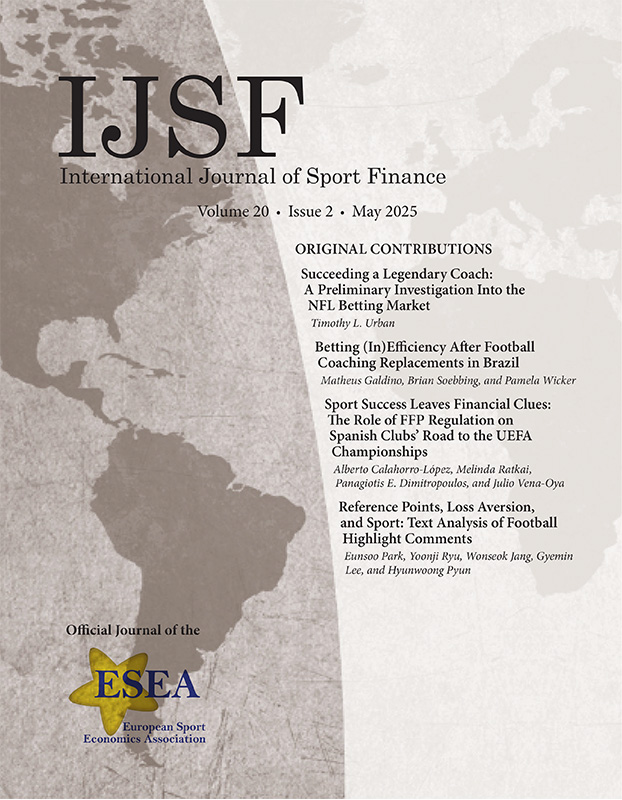
Articles
Succeeding a Legendary Coach: A Preliminary Investigation Into the NFL Betting Market
Some coaches are so successful and have such an impact on their team that they are considered “legendary.” When they step down from their position and the team transitions to a new head coach, there will likely be a great deal of uncertainty concerning how the team will perform in this new situation; thus, it may take time for the betting markets to adjust. The purpose of this study is to investigate the efficiency of a sports betting market for the rare situation in which a legend steps down from the head coaching position. Data from the National Football League are analyzed using a novel implementation of classification trees to determine if and when a market inefficiency exists in the subsequent season. We find a potential bias early in the following season before the market appears to adjust to the new coach.
Keywords: sports betting markets, National Football League, classification trees, market efficiency, point spread betting
DOI: 10.32731/IJSF/202.052025.01
Betting (In)Efficiency After Football Coaching Replacements in Brazil
This study analyzes how the sports betting market responds to changes of head coaches in Brazilian football using data from 11 seasons (2010‒2020), including 4,180 official league games and 379 within-season coaching replacements. We examine the return on investment (ROI) for bets to win and bets to lose for three betting strategies: when head coaches joined their teams (1) after a dismissal, (2) following a resignation, and (3) when transition coaches worked between effective replacements. The regression results show significant positive effects on ROI for bets to win for games 5, 7, and 8 following a dismissal, as well as for games 4‒6 following a resignation. Betting on games 3 and 5 (after a dismissal) and games 2 and 4 (after a resignation) has a significant negative effect on ROI for bets to lose. Collectively, the findings indicate some inefficiencies of the betting market that could be exploited by bettors.
Keywords: bookmaker, coach turnover, managerial change, soccer, South America
DOI: 10.32731/IJSF/202.052025.02
JEL Codes: Z23, L83, G14
Sport Success Leaves Financial Clues: The Role of FFP Regulation on Spanish Clubs’ Road to the UEFA Championships
This study measures the impact of Financial Fair Play (FFP) in the Spanish football league by considering three objectives: (1) the probability of qualifying for European competition, (2) if sporting objectives can be related to the financial situation of the clubs, and (3) changes in the financial-accounting structure. The sample contains 176 observations from 13 Spanish clubs between 2004‒2019. The empirical findings reveal that the likelihood of qualifying for European competition is sensitive to certain financial items. It was found that the greater the intangible assets were (pre-FFP), the higher the probability of participating in European competition was. A shift toward financial efficiency was observed due to regulatory change in terms of earnings before interest and taxes (EBIT) and ratio of personnel expenses/operating income, which allows us to conclude that the FFP has opened a new dimension in the professionalization and innovation of financial management in football.
Keywords: financial fair play, financial management, football management, intangible assets, UEFA, Spanish League, soccer
DOI: 10.32731/IJSF/202.052025.03
Reference Points, Loss Aversion, and Sport: Text Analysis of Football Highlight Comments
This study performed a direct test of reference-dependent preferences with loss aversion in National Football League fans. For the 2021 and 2022 seasons, we collected all comments from YouTube game highlights. Subsequently, we identified each user’s supporting team and performed sentiment analysis to estimate sentiment scores using a pretrained deep learning model. Least squares dummy variable regressions were applied to examine reference-dependent preference and loss aversion, using win and win probability and upset results with the sentiment score of comments as an outcome. The results consistently showed that fans posted comments as reference-dependent preference predicts. We also provide evidence supporting loss aversion using upset outcomes after correcting for sample selection bias.
Keywords: reference-dependent preferences, loss aversion, sentiment analysis, National Football League, sample selection bias
DOI: 10.32731/IJSF/202.052025.04

